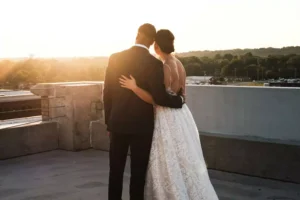The third time’s the charm — or so it’s been said. In my husband, Ted’s, case, it was true. I was his third fiancée. But unlike his two previous broken engagements, ours ended with, “You may now kiss the bride.” As I write this, we are nearing our 21st wedding anniversary.
I have spent over two decades with this man of mine. But in the early days of our engagement and even into the first year of our marriage, I had to process that he hadn’t always been mine.
Obviously, “not always been mine” is true for all married couples. Every spouse has lived a life before the “I do,” and for many of us, that included dating others. Ted wasn’t my first boyfriend.
So, what was the big deal?
Even though I was confident God had brought Ted and me together, I still struggled with the reality that someone else had called him her fiancé first. Someone else had received an engagement ring from him before me. And when he’d first asked, “Will you marry me?” it wasn’t directed towards me.
While I’m not overly competitive by nature, the truth is, I didn’t love coming in third.
You’re not the first, but you’re (hopefully) the last
Maybe you’re seriously dating someone with a broken engagement in their past, and you’re talking about marriage. Or it could be that you’re already engaged and planning a wedding together. Whatever stage you’re in, I’m confident you’re excited about the future — as you should be!
But you also may be experiencing some emotions you didn’t expect. Like me, you could be struggling with feelings of loss in the middle of your newfound joy and anticipation.
I don’t know about you, but I was conflicted when I felt those not-so-happy emotions. Shouldn’t I only be happy and grateful that Ted was with me now? Wasn’t the past in the past — where it should stay? Some would say yes. But I think it’s more complicated than that.
Here’s the thing. A broken engagement is a loss for the person you’re with. They have grieved it and come to terms with it (if they haven’t, that may be a red flag, but we’ll get to that in a bit). For them, it’s hopefully in the past.
For you, though, it’s very much in the present. You’re facing it, but from a different perspective. It’s not the loss of a relationship or potential future, but the loss of knowing you aren’t the first to experience life-changing milestones with the person with which you hope to spend the rest of your life.
Here’s the thing. Scripture teaches us that we weren’t created for a world full of brokenness. It was never God’s intention for us to experience loss. Because of that, feeling sadness or anger in the face of any loss is normal. It’s OK and healthy to grieve both big and small ones. This means it’s normal to feel sad about coming in second — or even third.
So, while some might encourage you to only focus on the positive and feel gratitude, I’m not here to do that. I think you must work through your feelings. You may be able to do that one-on-one with God, or you might need to bring in a trusted friend or counselor.
Signals your emotions may not be healthy
But how do you know when the emotions you feel are normal and when they’ve become unhealthy? Here are a couple things to consider.
1. You are stuck.
When you were younger, did you ever audition for a play, a musical, a choir, or the school band? Maybe you were cast in the show but didn’t get the part you wanted. Or perhaps you made second chair instead of first. You probably felt disappointed, right? But eventually, you had to move on from your disappointment and step into the role you did get.
The same is true for marrying someone who has been engaged. There is “a time to weep,” as Ecclesiastes 3:4 says, but it is a season or a temporary part of the process. If you find your focus stuck on the broken engagement for an extended period and can’t move to “a time to laugh,” your feelings may no longer be healthy or helpful.
One way to get stuck is to ask the wrong questions. What do I mean by that?
I had the wisdom not to request too many specifics. I posed the “big picture” questions. For example:
- How long were you together?
- Why did the engagement end?
- Is she still active in your life?
- What are you doing differently in our relationship?
These types of details helped me better understand the situation and whether Ted was repeating any of the unhealthy relational patterns that characterized the prior relationship.
Wrong questions are the ones that fixate on satisfying your curiosity and the more minor details that don’t contribute to the health of your current relationship or upcoming marriage. For example:
- What was the proposal like?
- What did the ring look like?
- Was she pretty?
- What did you have planned for the wedding?
I’m not encouraging you to bury issues that you need to discuss. But you don’t need to know everything — and you can get stuck when you try to do so.
2. You are fearful.
“You know how I told you I was engaged before?” Ted told me one night about six months into our marriage. “Well, I was actually engaged twice before.”
I wasn’t expecting this confession and was unsure how to process it. I thought I’d come to terms with the broken engagement I’d known about. Now I was being asked to work through a second one, and this time after marriage.
It turns out Ted had been afraid when we were dating to tell me he’d had two failed engagements. After all, what if it scared me off?
True, it might have made me uneasy and concerned that the third time wouldn’t be the charm. Yet I had dated, gotten engaged to, and married Ted with the confidence that God wanted us together. While I struggled with not being Ted’s first fiancée, fear wasn’t an emotion I experienced. But it might be one you’re feeling. So what do you do with it?
First, pray about it. Ask God how He wants you to respond to it. I think a little bit of initial fear is normal. But if it grows and starts to dominate your thoughts, there might be a problem.
Second, talk about it with someone you trust — preferably someone who knows both you and the other person well. They can give you their perspective on your relationship and whether they believe your fear has hit the point of unhealthy.
Possible red flags
Are there reasons to reevaluate whether you should marry this person? Unease or a check in your spirit should prompt you to look for these red flags:
1. They talk too much about the past fiancé. They may not have moved on. You don’t want to marry someone who is holding on to a past fiancé or relationship.
2. They take no responsibility for the breakup. Most of the time, it takes two. Listen to how they share with you what happened. If they take no responsibility for problems in the relationship and blame it all on the other person, it shows a lack of maturity and humility.
3. They haven’t made relational changes. Are they doing things differently with you? For example, if there was a lack of physical boundaries in the past, has that changed with you? If communication was an issue, are they striving to do better in that area?
Three ways to process your emotions
If your feelings are healthy and you aren’t seeing red flags, how do you process the emotions of coming in second — or, like me, third?
1. It takes time. Time certainly doesn’t heal all wounds, but it does help us process what we’re feeling and gain perspective. Give yourself time, but also be sure that you aren’t stuck or feeding fear.
2. It takes trust. Yes, you want to trust the person you’re with. But more importantly, trust God and His plan for you. If you are confident that God has brought you two together, also trust that He will help you work through your emotions.
3. It takes understanding. The person you’re with isn’t thrilled about having brokenness in their relational past, either. Understand that it was probably hard for them to share that part of their story with you. They too may feel a bit sad that you aren’t their first fiancé.
The long haul
“I think I’ll call you ‘Laurie,’” I jokingly told Ted in the first decade of our marriage. I’d grown up with “Little Women,” and the Theodore in that story was affectionally called “Laurie.”
But he quickly told me no. I’d forgotten that Ted’s second fiancée had been named Laurie. This story goes to show that working through my feelings of loss early on helped me get to the place where I forget that I was ever third.
Now, almost 21 years later, Ted and I even can lightheartedly joke about his broken engagements. After all, I may have been the third woman he proposed to, but I’m the only one he married.
Copyright 2023 Ashleigh Slater. All rights reserved.











